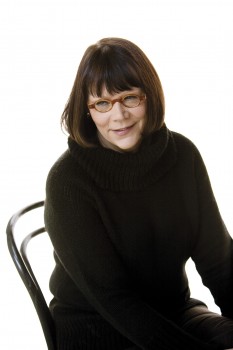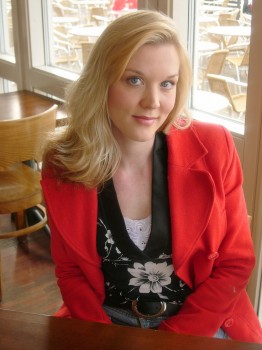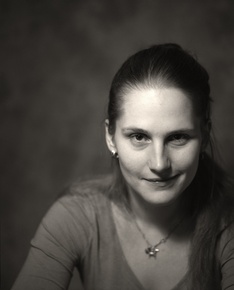Tag: novel
Jari Tervo: Layla
28 October 2011 | Mini reviews, Reviews
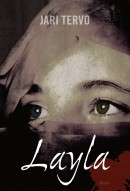 Layla
Layla
Helsinki: WSOY, 2011. 361 p.
ISBN 978-951-0-38277-6
31 €, hardback
Social reality has stepped firmly into contemporary Finnish literature. Many of the new novels deal with economic inequality, immigration, prostitution or human trafficking. In his 13th novel Jari Tervo (born 1959) deals with them all. Layla is a young Kurdish girl whose cruel fate is about to be decided by the men of her family in Turkey. When she flees, Layla ends up in faraway Finland as a prostitute. Another storyline portrays a Finnish woman, Helena, who sells herself in part voluntarily. Tervo shows himself to be a feminist; the men he describes are cold tyrants who see a woman’s body as an object of lust and as merchandise. The novel is tragic and defiant, but also amusing and lively. Tervo’s style involves surprises and ingenious tricks, of which towards the end of the book there are slightly too many. Layla contains a good deal of information about Turkey, Kurdish culture and the people smuggling that takes place on the outer borders of the European Union. Some of the details have already been shown to be inaccurate, but this does not reduce the distressing quality of this story of a human fate.
Translated by David McDuff
Back in the USSR
3 October 2011 | Fiction, Prose
Extracts from Rosa Liksom’s novel Hytti nro 6 (‘Compartment no 6’, WSOY, 2011). Review by Mervi Kantokorpi
Moscow hunched itself in the dry, frosty March night, protecting itself from the touch of the icy red sun as it set. The girl entered the train’s last sleeping carriage, found her compartment, compartment number six, and breathed deeply. There were four beds in the compartment, the upper ones folded agains the wall, while between the beds was a small table, on the table a white table cloth and a plastic flower vase containing a bunch of pink paper carnations, faded by time; the shelf above the end of the bed was full of large, untidily secured parcels. The girl shoved her modest old suitcase, the one she had got from Zahar, into the metal luggage space under the hard, narrow bed; her small backpack she threw on the bed. When the station bell sounded for the first time, the girl went to stand by the corridor window. She breathed in the scent of the train, iron, coal-dust, the smells left behind by dozens of cities and thousands of people. Travellers and those who had come to see them off pushed past her, shoving her with their cases and parcels. The girl touched the cold window with her hand and looked at the platform. This train would take her through villages inhabited by deportees, through the open and closed towns of Siberia to the capital of Mongolia, Ulan Bator. More…
Notes for an unwritten autobiography
15 September 2011 | Fiction, Prose
Extracts from the novel William N. Päiväkirja (‘William N. Diary’, Otava, 2011). Interview by Soila Lehtonen
Paris, 15 November 1897
Constance probably bought this notebook for housekeeping purposes, but forgot it when she left, so I shall take it for my use, and I am not going to tear a single page, because the paper is of good quality and the covers are made of calico. When I write in a small hand there is plenty of room for the text, and when I write in Swedish Constance will not understand, if she chances to see the notebook. She has promised to visit once or twice a week and continue to bring food and do the cleaning (we cleared up the differences of opinion that were related to her departure), even though she has now moved and married a retired officer, having been my housekeeper for nearly 30 years. The laundry she has delegated to Madame L., who lives in this house, although that lady is intolerably nosy and talkative, and she has six smutty children. I have decided to write my autobiography, so that posterity shall receive a full and proper impression of my work. (Let Prof. Schwendener from Berlin and Dr Louis Pasteur be content with minor roles!) I shall not begin until tomorrow, for today I intend to study the specimens of South American lichens Prof. D. has sent if there is enough daylight. More…
Paris match
30 June 2011 | Articles, Non-fiction
In 1889 the author and journalist Juhani Aho (1861–1921) went to Paris on a Finnish government writing bursary. In the cafés and in his apartment near Montmartre he began a novella, Yksin (‘Alone’), the showpiece for his study year. Jyrki Nummi introduces this classic text and takes a look at the international career of a writer from the far north
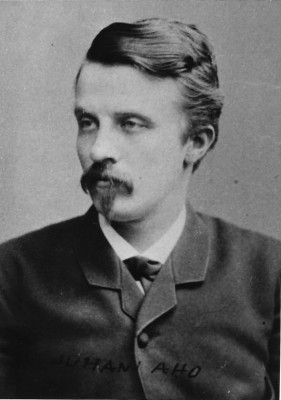
Juhani Aho. Photo: SKS/Literary archives
Yksin is the tale of a fashionable, no-longer-young ‘decadent’, alienated from his bourgeois circle, and with his aesthetic stances and social duties in crisis. He flees from his disappointments and heartbreaks to Paris, the foremost metropolis at the end of the 19th century, where solitude could be experienced in the modern manner – among crowds of people. Yksin is the first portrayal of modern city life in the newly emerging Finnish prose, unique in its time.
Aho’s story has parallels in the contemporary European literature: Karl-Joris Huysmans’s A Rebours (1884), Knut Hamsun’s Hunger (1890) and Oscar Wilde’s The Portrait of Dorian Gray (1890). More…
From the land of abundant reindeer…
17 March 2011 | This 'n' that

Rangifer tarandus, Finnish Lapland. Photo: Grand-duc (http://en.wikipedia.org/wiki/User:Grand-Duc)
Is Finland, a land of reindeer, ‘dense pine forests and deep snows’ also a ‘quiet literary landscape’?
Not exactly, as we at Books from Finland hope we are demonstrating. And over on the Bookslut website, Bonnie B. Lee comes to the same conclusion, after having mused about the reindeer (yes: in Helsinki you find tasty chunks of them in the freezer boxes of any foodstore) and reading three Finnish novels in English translation.
The novels Lee reviews are Purge by Sofi Oksanen (Puhdistus, 2008, translated by Lola Rogers, published last year), When I forgot by Elina Hirvonen (Että hän muistaisi saman, 2005, translated by Douglas Robinson, published in 2009) and The Year of the Hare by Arto Paasilinna (Jäniksen vuosi, 1975, first published in an English translation by Herbert Lomas in 1995, reprinted as a Penguin edition last year).
We have just entered the Year of the Rabbit, in recognition of which Paasilinna’s book (about a man who rejects his old life and goes roaming the wildernesses with a hare as his only companion) has appeared on the tables of large bookstores in the US. ‘The Year of the Hare is only the most Finnish, and perhaps most antically Zen-ish, of a shelf-load of books that tell us to find and live by our own ideas of contentment,’ said The Wall Street Journal.
The traumatic experiences of war and Finland’s deep forests are the common feature of these novels, Bonnie B. Lee finds. She also opines that ‘melancholy pervades the Finnish psyche’, and that ‘Finland vies with Hungary for highest suicide rate in Europe‘. Oh, but this latter is no longer true: number one on a World Health Organisation suicide rates list is Lithuania, followed by Hungary, Slovenia, Estonia and Latvia – Finland is number six.
Lee is clearly intrigued by her travels in contemporary Finnish literature. ‘The search for identity, a reckoning with a troubled past, and an outsider’s view looking in,’ she comments, ‘are all the stuff of great writing, and Finland is poised to continue to produce poignant and introspective literature that we can appreciate now that English translators have begun the work.’
Poignant and introspective or occasionally funny and fantastical, this is the work we try to offer an early glimpse of, in translation, at Books from Finland. Stay with us!
Is it a play, is it a book?
25 February 2011 | This 'n' that
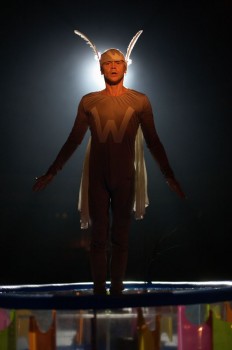
On the way to fame: Walt the Wonder Boy in Kristian Smeds's stage adaptation of Paul Auster's novel Mr. Vertigo at the Finnish National Theatre (2010). Photo: Antti Ahonen
Dramatisations of novels are tricky. Finnish theatremakers like adapting novels for the stage, which often results in a lot of talking instead of action – and action here doesn’t refer to just physical movement but to the subtext, to what happens under and behind the words.
Currently an adaptation of an American novel is running on the main stage of the Finnish National Theatre in Helsinki. Mr Vertigo (1994), Paul Auster’s seventh book, tells the story of an orphan boy in the 1930s St Louis. After harsh years as the long-suffering apprentice of the mysterious Master Yehudi, Walt becomes the sensational Wonder Boy by learning how to levitate.
In theatremaker Kristian Smeds’s adaptation, Auster’s whimsical, rambling novel becomes a capricious, illusory journey about illusions, freedom, and the unattainability of love. Walt (the highly expressive, athletic Tero Jartti) interprets, with hilarious comedy as well as with touching desperation, both the dizzyingly powerful experience of creativity and the ridiculous hubris of the artist. More…
Inside and out
14 February 2011 | Reviews
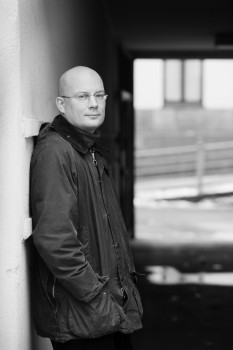
Markku Pääskynen. Photo: Ville Palonen
It is typical of Markku Pääskynen’s fiction for horrible things to happen both in people’s internal worlds and what goes by the name of the objective reality around them, and you can’t always be sure which one they’re happening in – or they’re happening in both.
From his debut novel, Etanat (‘Snails’, 2002, Tammi), onwards Markku Pääskynen (born 1973) has created a highly original body of work. His special strengths are his linguistic and narrative virtuosity, which allow him to make surprising events and narrative solutions come off in a controlled manner.
Pääskynen’s third novel, Tämän maailman tärkeimmät asiat (‘The most important things of this world’, 2005, featured in Books from Finland 1/2006), was a description of a single day that focused on the relationship between an adult son and his mother. Pääskynen’s sixth book, Enkelten kirja (‘Book of Angels’, 2010), is constructed out of sensory perceptions, thoughts, feelings and memories. The reader has to stay on his toes in piecing together the course of events, gradually revealed from behind these elements, and to find the story behind the plot. More…
Do you remember the yellow house?
14 February 2011 | Fiction, Prose
Extracts from the novel Enkelten kirja (‘The book of angels’, Tammi, 2010)
[Tallinn, summer] The past will not go away
and the present is insurmountable. Summer vacation has begun, the newspaper hasn’t come; it doesn’t get delivered here anyway. Can you remember the Isabelline yellow house? Remember the alley with the name that means hurry? Surely you remember the home with all the maps on the shelves, the important papers and the brass objects bought from nearby antique dealers? Also the rugs from North Africa and the obligatory cedar camel figurines on the windowsill. And so many glasses and plates and empty lighters in a cardboard box on the shelf on the left hand side of the kitchen.
Tallinn, June 7th. The floors creak. One step has split in half; some of the lights have burned out. This is a lovely home. A small window upstairs is ajar to the courtyard. Tuomas had latched it behind the Virginia creepers. The fountain in the courtyard is dry. On cold nights the smoke from the fireplace grows like a statue for the crows until it wraps around over the layered rooftops like a snake eating its tail. Russian men are repairing the attic of the house across the street for wealthy people to live in; they laugh in front of the window and smoke. Tuomas waves at them, and they wave back. The courtyard is creepy when it’s empty. Soon the neighbours would go about their day and quietly close their doors behind them, and two nearby churches would divide the hours into quarters, Russians and their gossip would make their way to the Alexander Nevski Cathedral, and the Estonians and their gossip would go to their own churches where a wise and peculiar, almost human scent would rise from between the headstones. Tuomas wouldn’t smell it, Aino would and would move to stand beneath the the center tower. More…
Alexandra Salmela: 27 eli kuolema tekee taiteilijan [27, or death makes the artist]
13 January 2011 | Mini reviews, Reviews
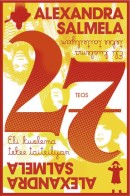 27 eli kuolema tekee taiteilijan
27 eli kuolema tekee taiteilijan
[27, or death makes the artist]
Helsinki: Teos, 312 p.
ISBN 978-951-851-302-8
€ 25.90, hardback
Alexandra Salmela (born 1980) is a Slovakian-born dramaturge and literature graduate who has settled in Finland. The book’s main character, Angie, lives in Prague and suffers from an idée fixe: all her idols, such as Jimi Hendrix, Kurt Cobain and Janis Joplin, died, already famous, before their 28th birthdays, but her own literary career has yet to take wing. The frustrated Angie’s literature lecturer has a lake cottage in Finland where Angie meets an eco-minded family in the middle of the sparsely populated Finnish countryside. The clash between the chaotic family life and Angie’s wannabee artistic temperament are skilfully handled by Salmela, who has a secure grasp of literary means and a playful use of the Finnish language. Among the narrative voices employed by Salmela are the family’s cat and a piggy toy. Situational comedy, farce and a tragic Entführungsroman combine in the narratives, and the result is a malicious, funny work that pokes fun at everyone. The novel was awarded the Helsigin Sanomat newspaper’s prize for the best first novel, and appeared on the shortlist for the Finlandia Prize for Literature.
‘Joy and peace prevail…’
25 December 2010 | Fiction, Prose
Dear readers,
to celebrate the change of the year we publish an extract from Aleksis Kivi’s 1870 classic novel, Seitsemän veljestä (Seven Brothers), translated by David Barrett, and a bit of a classic of our own too: it’s a nostalgic glimpse of a Finnish Christmas spent in a humble cottage inhabited, in addition to the eponymous seven brothers, a horse, cat, cockerel and two dogs (at least). Enjoy!
Soila Lehtonen & Hildi Hawkins & Leena Lahti
On a festive night
It is Christmas Eve. The weather has been mild, grey clouds fill the sky, hills and valleys are covered with the snow that has only recently begun to fall. The forest gives out a gentle murmur, the grouse goes to roost in the catkined birch, a flock of waxwings descends on the reddening rowan, while the magpie, daughter of the pine-wood, carries twigs for her future nest. More…
Profession: author
10 December 2010 | In the news
Alexandra Salmela, 30, won the Helsinki newspaper Helsingin Sanomat Literature Prize 2010 for best first work, worth €15,000.
Her novel 27 eli kuolema tekee taiteilijan (’27 or death makes one an artist’, Teos) depicts a young woman’s search for her own place and calling in the world. Angie leaves her city of study, Prague, for a small Finnish village, wishing to become an author. Among the narrators are also a soft piggy toy, a cat and a car.
With degrees from both the Theatre Academy of Bratislava and Charles University of Prague, the Slovak-born Salmela majored in Finnish and Finnish literature. She has lived in Tampere, Finland for the past four years. In her opinion Finns should scrap the myth about their difficult language.
The jury chose the winner from 80 debut works, finding Salmela’s novel highly original in its imaginative narrative techniques and language.


